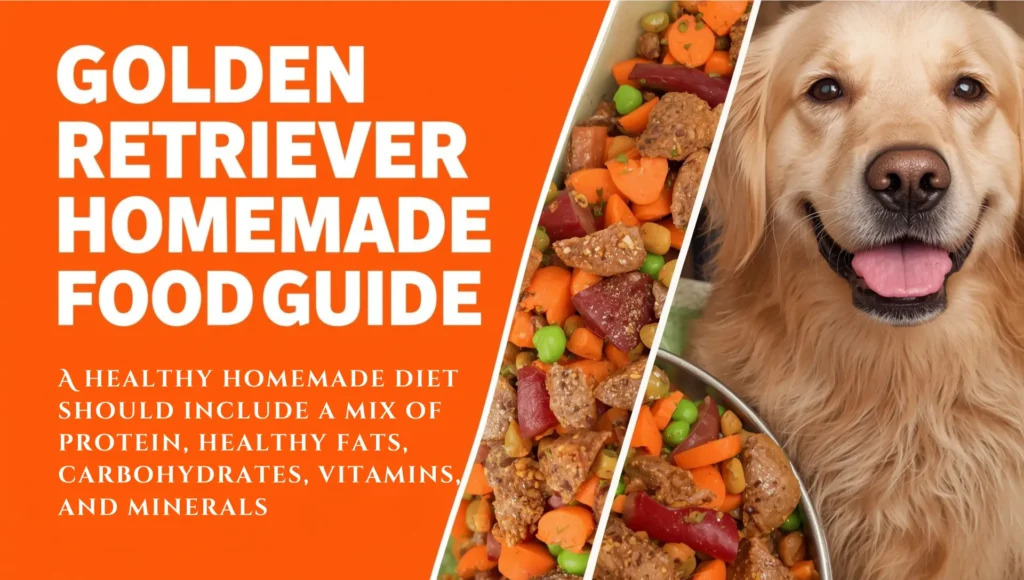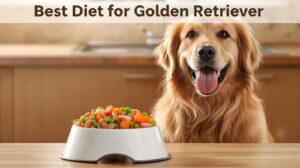Homemade Dog Food for Golden Retrievers: A Complete Nutritional Guide

Golden Retrievers are beloved family companions known for their gentle temperament and active lifestyle. When considering homemade dog food for golden retrievers, pet owners must understand the unique nutritional requirements these energetic dogs need to thrive. Creating balanced homemade meals requires careful planning to ensure your golden retriever receives all essential nutrients for optimal health.
Table of Contents
Understanding Golden Retriever Nutritional Needs
Protein Requirements for Active Dogs
Golden Retrievers require high-quality protein to support their active lifestyle and maintain healthy muscle mass. Adult golden retrievers need a minimum of 18% protein in their diet, while puppies require at least 22% protein according to AAFCO standards. AAFCO requires minimum percentages of crude protein and crude fat in all commercial pet foods, and these same standards apply to homemade dog food for golden retrievers.
Veterinary nutritionist Dr. Jennifer Larsen emphasizes that “protein quality matters more than quantity when preparing homemade meals for dogs.” Premium protein sources for homemade dog food for golden retrievers include lean chicken, turkey, fish, and eggs. These ingredients provide essential amino acids necessary for proper growth and development.
Essential Fat Content
Golden Retrievers need adequate fat content to maintain their lustrous coats and support cognitive function. Adult dogs require a minimum of 5.5% fat, while puppies need at least 8.5% fat content in their diet. Healthy fat sources for homemade dog food for golden retrievers include fish oil, chicken fat, and flaxseed oil, which provide omega-3 and omega-6 fatty acids.
Benefits of Homemade Dog Food for Golden Retrievers
Ingredient Control and Quality Assurance
Preparing homemade dog food for golden retrievers allows pet owners complete control over ingredient quality and sourcing. You can select organic, locally-sourced ingredients and avoid preservatives, artificial colors, and questionable additives commonly found in commercial dog foods.
Dr. Sarah Wooten, a veterinarian and pet nutrition expert, states: “Homemade diets allow owners to customize meals based on their dog’s specific needs and preferences.” This personalization is particularly beneficial for golden retrievers with food sensitivities or allergies.
Cost-Effectiveness and Freshness
Many pet owners find that homemade dog food for golden retrievers can be more economical than premium commercial brands, especially when buying ingredients in bulk. Fresh ingredients also provide better nutrient bioavailability compared to processed kibble that may have lost nutritional value during manufacturing.
Potential Risks and Considerations
Nutritional Imbalances
A UC Davis study found that very few of 200 recipes analyzed provided all essential nutrients in adequate amounts for meeting established canine health standards. This research highlights the critical importance of proper formulation when preparing homemade dog food for golden retrievers.
Common nutritional deficiencies in homemade diets include:
- Calcium and phosphorus imbalances
- Insufficient vitamin D and B vitamins
- Inadequate trace minerals like zinc and copper
- Improper calcium-to-phosphorus ratios
Time Investment and Preparation
Creating balanced homemade dog food for golden retrievers requires significant time investment for meal planning, shopping, preparation, and cooking. Pet owners must also understand proper food storage and safety protocols to prevent bacterial contamination.
Essential Ingredients for Golden Retriever Homemade Food
High-Quality Protein Sources
The foundation of homemade dog food for golden retrievers should include:
- Lean chicken breast or thighs (boneless, skinless)
- Turkey (ground or whole pieces)
- Fish (salmon, mackerel, sardines)
- Eggs (cooked)
- Lean beef or lamb (occasionally)
Complex Carbohydrates
Golden Retrievers benefit from easily digestible carbohydrates that provide sustained energy:
- Sweet potatoes
- Brown rice
- Quinoa
- Oats
- Pumpkin
Vegetables and Fruits
Nutrient-rich vegetables and fruits should comprise approximately 25% of homemade dog food for golden retrievers:
- Carrots (cooked)
- Green beans
- Broccoli (small amounts)
- Spinach
- Blueberries
- Apples (without seeds)
Sample Recipe for Homemade Dog Food for Golden Retrievers
Balanced Chicken and Sweet Potato Recipe
Ingredients:
- 2 pounds boneless, skinless chicken thighs
- 1 cup cooked brown rice
- 1 large sweet potato, cubed
- 1/2 cup green beans, chopped
- 1/4 cup carrots, diced
- 1 tablespoon fish oil
- 1/4 cup chicken broth (low sodium)
Instructions:
- Cook chicken thoroughly and shred into bite-sized pieces
- Steam sweet potatoes until tender
- Lightly steam vegetables until soft
- Combine all ingredients and mix thoroughly
- Allow to cool before serving
This recipe provides approximately 4-5 servings for an adult golden retriever. Always consult with your veterinarian before implementing homemade dog food for golden retrievers as a primary diet.
Transitioning to Homemade Dog Food
Gradual Introduction Protocol
When switching to homemade dog food for golden retrievers, implement a gradual transition over 7-10 days:
- Days 1-2: 75% current food, 25% homemade
- Days 3-4: 50% current food, 50% homemade
- Days 5-6: 25% current food, 75% homemade
- Days 7+: 100% homemade food
Monitor your golden retriever for digestive upset, changes in stool consistency, or decreased appetite during the transition period.
Working with Veterinary Nutritionists
Professional Guidance and Recipe Formulation
Board-certified veterinary nutritionists have provided proven solutions for feeding dogs fresh food for two decades, making their expertise invaluable when creating homemade dog food for golden retrievers. Professional formulation ensures nutritional adequacy and prevents deficiency-related health issues.
Dr. Lisa Freeman, a board-certified veterinary nutritionist, recommends: “Pet owners should work with qualified professionals to create properly balanced homemade diets that meet their dog’s specific life stage and health requirements.”
Supplementation Requirements
Essential Vitamins and Minerals
Most homemade dog food for golden retrievers requires supplementation to achieve complete nutrition. Common supplements include:
- Calcium carbonate or bone meal
- Multivitamin complexes designed for dogs
- Fish oil for omega-3 fatty acids
- Vitamin E (as an antioxidant)
Never use human supplements, as they may contain ingredients toxic to dogs, such as xylitol or excessive vitamin levels.
Storage and Food Safety
Proper Storage Techniques
Homemade dog food for golden retrievers should be stored safely to prevent bacterial growth:
- Refrigerate prepared meals for up to 3-4 days
- Freeze portions for up to 3 months
- Use glass or BPA-free containers
- Thaw frozen meals in the refrigerator, never at room temperature
Food Safety Protocols
Follow strict food safety guidelines when preparing homemade dog food for golden retrievers:
- Wash hands thoroughly before and after food preparation
- Use separate cutting boards for raw meats
- Cook all proteins to appropriate internal temperatures
- Clean and sanitize all preparation surfaces
Monitoring Your Golden Retriever’s Health
Signs of Nutritional Adequacy
Well-balanced homemade dog food for golden retrievers should result in:
- Shiny, healthy coat
- Appropriate body weight maintenance
- Good energy levels
- Normal digestive function
- Healthy teeth and gums
Regular veterinary check-ups and blood work can help identify any nutritional deficiencies before they become serious health concerns.
Cost Analysis and Budget Planning
Financial Considerations
The cost of homemade dog food for golden retrievers varies based on ingredient quality and sourcing. On average, homemade diets cost between $3-8 per day for an adult golden retriever, compared to $2-6 for premium commercial foods.
For more detailed guidance on golden retriever nutrition and care, visit our comprehensive golden retriever guides for additional resources and expert advice.
External Resources and Professional Support
For recipe formulation and nutritional analysis, consider consulting with certified pet nutritionists through the BalanceIT platform, which provides veterinary-approved recipes and supplementation guidelines.
Conclusion
Creating nutritionally balanced homemade dog food for golden retrievers requires dedication, knowledge, and professional guidance to ensure optimal health outcomes. While homemade diets offer benefits like ingredient control and customization, they also present risks if not properly formulated. The key to success lies in working with qualified veterinary nutritionists, following established nutritional guidelines, and monitoring your golden retriever’s health closely. By understanding the unique dietary needs of golden retrievers and implementing proper food safety protocols, pet owners can provide wholesome, nutritious meals that support their dog’s long-term health and vitality. Are you ready to take the next step in providing the best possible nutrition for your beloved golden retriever?



